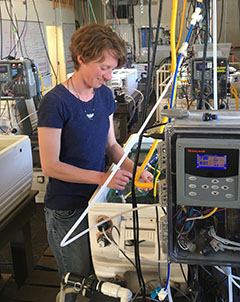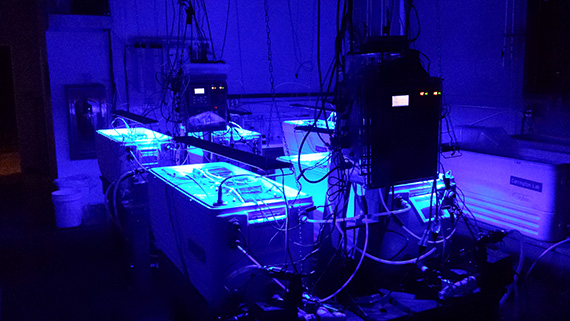FHL's Ocean Acidification Environmental Lab
By Rebecca Guenther
The Ocean Acidification Environmental Laboratory (OAEL) at FHL is a state-of-the-art experimental and instructional facility for conducting research on ocean change. This unique center houses an analytical laboratory for measuring seawater chemistry as well as indoor mesocosms for experimentation, allowing researchers to conduct biological experiments and analyze seawater chemistry on-site as their projects proceed. The analytical lab is equipped to measure carbon-system variables of importance to ocean acidification research, including spectrophotometric pH, total alkalinity, and dissolved inorganic carbon. The indoor mesocosms offer the ability to manipulate carbon-system variables via a custom seawater-CO2 blending system with precise control of temperature and pH. The OAEL is approved for research on seaweeds, plants, invertebrates, and fish.
 The indoor mesocosm system is constructed of custom-designed mixing reservoirs (Igloo coolers) that provide researchers with independently-controlled pH and temperature conditions, making them ideal for organismal studies on climate change. Photo: Sasha Seroy.
The indoor mesocosm system is constructed of custom-designed mixing reservoirs (Igloo coolers) that provide researchers with independently-controlled pH and temperature conditions, making them ideal for organismal studies on climate change. Photo: Sasha Seroy.
The OAEL features 16 temperature-controlled, flow-through indoor microcosms, each of which can be individually controlled for temperature and pH levels. Incoming seawater is typically filter-sterilized; however, unfiltered seawater is also available. In addition, there are automated feeding systems available for use if needed. Adaptations can be made to control other variables, such as dissolved oxygen or alkalinity, providing researchers with the ability to do a wide range of work on different individual variables and combinations of variables.
In the summer of 2016, the OAEL hosted 4 graduate students and 2 REU (Research Experience for Undergrads) mentoring projects. These experiments spanned a wide variety of organisms and variables. Dr. Anthony Pires (Dickinson College) and his team of REU students explored the effects of ocean acidification on larval competence, metamorphosis, and juvenile performance of the planktotrophic gastropod, Crepidula fornicata. Sasha Seroy, a UW graduate student, investigated the impacts of ocean acidification on bryozoan growth and nudibranch-induced spine formation. Alyssa Liguori from Stony Brook University explored the effect of ocean acidification on long-term biological responses of the copepod Tigriopus californicus. Dr. Lisa Crummett (Soka University of America) and her REU student studied the impact of decreased pH on microbial communities from water samples collected from the FHL pumphouse. Morgan Eisenlord and Allison Tracy, both Cornell University graduate students, researched the role of temperature and virulence in labyrinthulid infections of the eelgrass species Zostera marina. Joanna Griffiths from Louisiana State University investigated the impact of ocean acidification on two populations of the solitary coral Balanophyllia elegans, from California.
 The indoor mesocosm system at night, with LED-generated moonlight. During the day, the lights provide full spectrum light for eelgrass experiments. Photo: Matt George.
The indoor mesocosm system at night, with LED-generated moonlight. During the day, the lights provide full spectrum light for eelgrass experiments. Photo: Matt George.
OAEL scientists also participated in projects that evaluate the carbonate chemistry of various time-series data sets — including those from San Juan Channel and areas inside and outside of Puget Sound — to address local issues. This initiative directly responds to recommendations from Washington State’s Blue Ribbon Panel for Ocean Acidification.
We are looking forward to another busy and productive year in the OAEL in 2017! We are anxiously awaiting the arrival of our new dissolved inorganic carbon (DIC) analyzer, which will allow us to generate a higher sample throughput. We also have several experiments planned for the upcoming summer season, with many returning users.
We warmly welcome new users to the OAEL year-round, from UW and off-campus. Fees for using the OAEL are scaled with respect to labor costs and UW affiliation. See http://tinyurl.com/fhl-oael for more detailed descriptions of the OAEL, and please contact the OAEL Manager, Rebecca Guenther (beccajo@uw.edu), for additional information.



